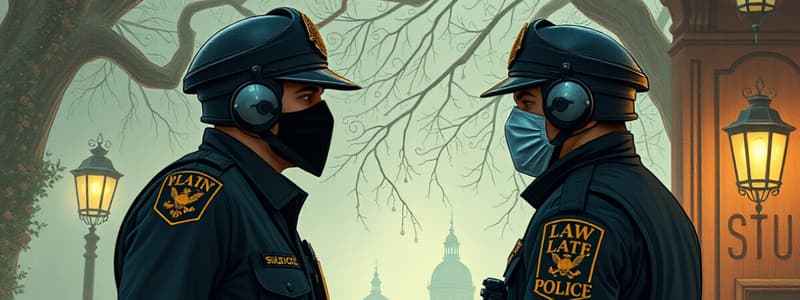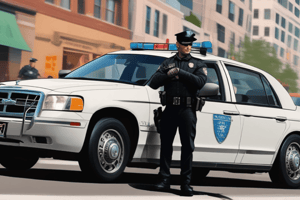Podcast
Questions and Answers
What can a peace officer ask for when stopping a person suspected of committing a crime?
What can a peace officer ask for when stopping a person suspected of committing a crime?
- Social security number
- The person's phone number
- A list of known associates
- Name and address (correct)
Which of the following items may an officer request from a person driving a motor vehicle?
Which of the following items may an officer request from a person driving a motor vehicle?
- Driver license (correct)
- Vehicle's maintenance records
- Passport
- Proof of residence
What happens if a person refuses to provide identification during a stop?
What happens if a person refuses to provide identification during a stop?
- They can be immediately arrested
- They may be charged with interference with police authority (correct)
- They will be let go without consequence
- They can request a supervisor on the scene
What is NOT required from an individual stopped by a peace officer?
What is NOT required from an individual stopped by a peace officer?
In what situation can a suspect be diverted to the Assessment Intake Diversion (AID) Center?
In what situation can a suspect be diverted to the Assessment Intake Diversion (AID) Center?
What is the legal outcome of being stopped by a peace officer?
What is the legal outcome of being stopped by a peace officer?
Flashcards are hidden until you start studying
Study Notes
Stopping of Suspect (CRS §16-3-103)
- A peace officer is authorized to stop individuals suspected of committing, having committed, or intending to commit a crime.
- Officers can request identification and personal information from the stopped individual, including:
- Name
- Address
- For drivers, officers may ask for additional documents:
- Driver's license
- Vehicle registration
- Proof of insurance
- Officers can inquire about the individual’s actions, such as their destination or recent location.
- Individuals are not obligated to respond to these inquiries; however, refusal to provide identification can lead to charges under DRMC 38-81(c) for interfering with police authority.
- The act of stopping does not equate to an arrest.
- If probable cause for arrest exists, officers may offer a diversion option:
- Suspects can be taken to the Assessment Intake Diversion (AID) Center for certain offenses, depending on the officer's discretion and the suspect's agreement.
Studying That Suits You
Use AI to generate personalized quizzes and flashcards to suit your learning preferences.





